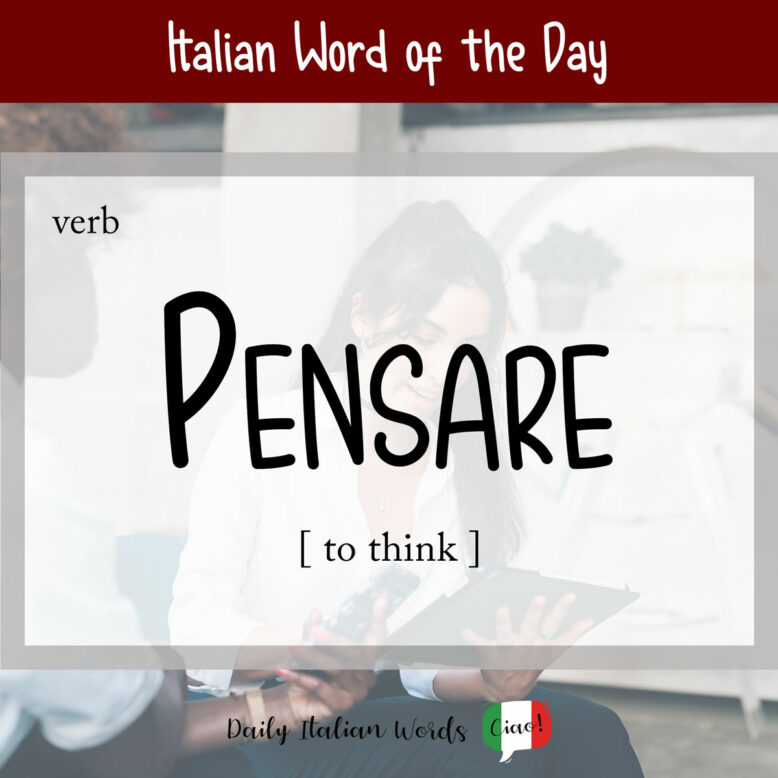Today we’re going to explore pensare, a common verb in the Italian language that will offer a gateway to convey your thoughts and feelings.
pensare
to think

Italian verbs are categorised into three classes: -are, -ire, and -ere. Pensare belongs to the first category, meaning that its conjugation in the present tense adheres the following pattern:
- io penso (I think)
- tu pensi (you think – informal)
- lui pensa (he thinks)
- lei pensa (she thinks)
- Lei pensa (you think – formal)
- noi pensiamo (we think)
- voi pensate (you think – plural)
- loro pensano (they think)
Pensare can be paired with the prepositions di (to) and a (of/about). When accompanied by di, pensare should be followed by an infinitive verb.
Penso di andare al cinema stasera.
I think I’ll go to the cinema tonight.
(literally “I think to go to the cinema tonight”)
Di is also used in the expressions Penso di sì (I think so) and Penso di no (I don’t think so).
When paired with the preposition a, it signifies “to think about / of” something.
Sto pensando a te.
I’m thinking about / of you.
Equally common is the usage of pensare with the conjunction che (that) and a subordinate clause. Due to the inherently uncertain nature of pensare, the verb in the subordinate clause often appears in its subjunctive form. For example, in the example sentence below, the speaker is expressing an opinion which may or may not be factual.
Penso che tu abbia ragione.
I think you are correct.
The use of the subjunctive can be circumvented only if the speaker holds absolute certainty about the accuracy of their thoughts.
Penso anch’io che lui è Mario. Riconosco la sua andatura.
I also think it’s Mario. I recognise his gait.

In English, we use the expression “just think…” when we feel excited, fascinated, or shocked by something, and we want the other speaker to feel the same way. In Italian, this can be expressed simply by using the imperatives pensa (singular) / pensate (plural).
Pensa che bello se tutti mantenessero le loro promesse.
Just think how nice it would be if everyone kept their promises.
Related to this is the exclamation Ma pensa un po’! which is comparable to the English “Well I never!” or “Imagine that!” Some variations on this include:
- Ma pensa te!
- Ma pensa solo!
- Ma ci pensi!
E pensare che… on the other hand, is identical to the English “And to think that…“
E pensare che l’amavo davvero! Che sciocco che sono stato!
And to think that I actually loved her! I’ve been such an idiot!
Another very common expression in Italian is Che cosa ne pensi? which means What do you think (of it / about it)? This is often abbreviated to just Cosa ne pensi? or Che ne pensi?
Note that ne is a particle that replaces something that was mentioned before. In the case of the following sentence, for example, it replaces disegno (drawing).
Ho appena finito il mio disegno. Che cosa ne pensi?
I’ve just finished my drawing. What do you think (of it)?
Speaking of widely used expressions, we mustn’t forget Ci penso io! which is how Italians would say “I’ll take care of it!” or “Leave it to me!“
It contains the pronominal verb pensarci (pensare + the particle ci “about it”), which means not only “to think about something” but also “to take care of / handle something”.

The negative (ma) non ci penso neanche / proprio, on the other hand, is what you would say when you wouldn’t even dream of doing something for fear of the repercussions.
Non toccare il mio biscotto! – Ma non ci penso neanche!
Don’t touch my cookie! – I wouldn’t even dream of it!
The array of expressions using pensare in Italian is extensive, and while a comprehensive list could span several pages, here’s a brief summary of a few other significant ones that you should acquaint yourself with.
senza pensare
without thinking
dar da pensare
to give cause to think / for anxiety
pensarci prima
to think about something beforehand
pensa e ripensa
after much thought
pensarci su
to think something over
pensare ai fatti propri
to mind one’s own business
ora che ci penso
come to think of it
pensaci bene
think it over / through
Let’s conclude this article with a fun Italian figure of speech – una ne fa e cento ne pensa – which can be translated into something along the lines of “while he is doing one thing he already is thinking about a hundred more” (Source: We The Italians). It depicts individuals who are able to contemplate their next steps and new projects even in the midst of demanding tasks.
Heather Broster is a graduate with honours in linguistics from the University of Western Ontario. She is an aspiring polyglot, proficient in English and Italian, as well as Japanese, Welsh, and French to varying degrees of fluency. Originally from Toronto, Heather has resided in various countries, notably Italy for a period of six years. Her primary focus lies in the fields of language acquisition, education, and bilingual instruction.


